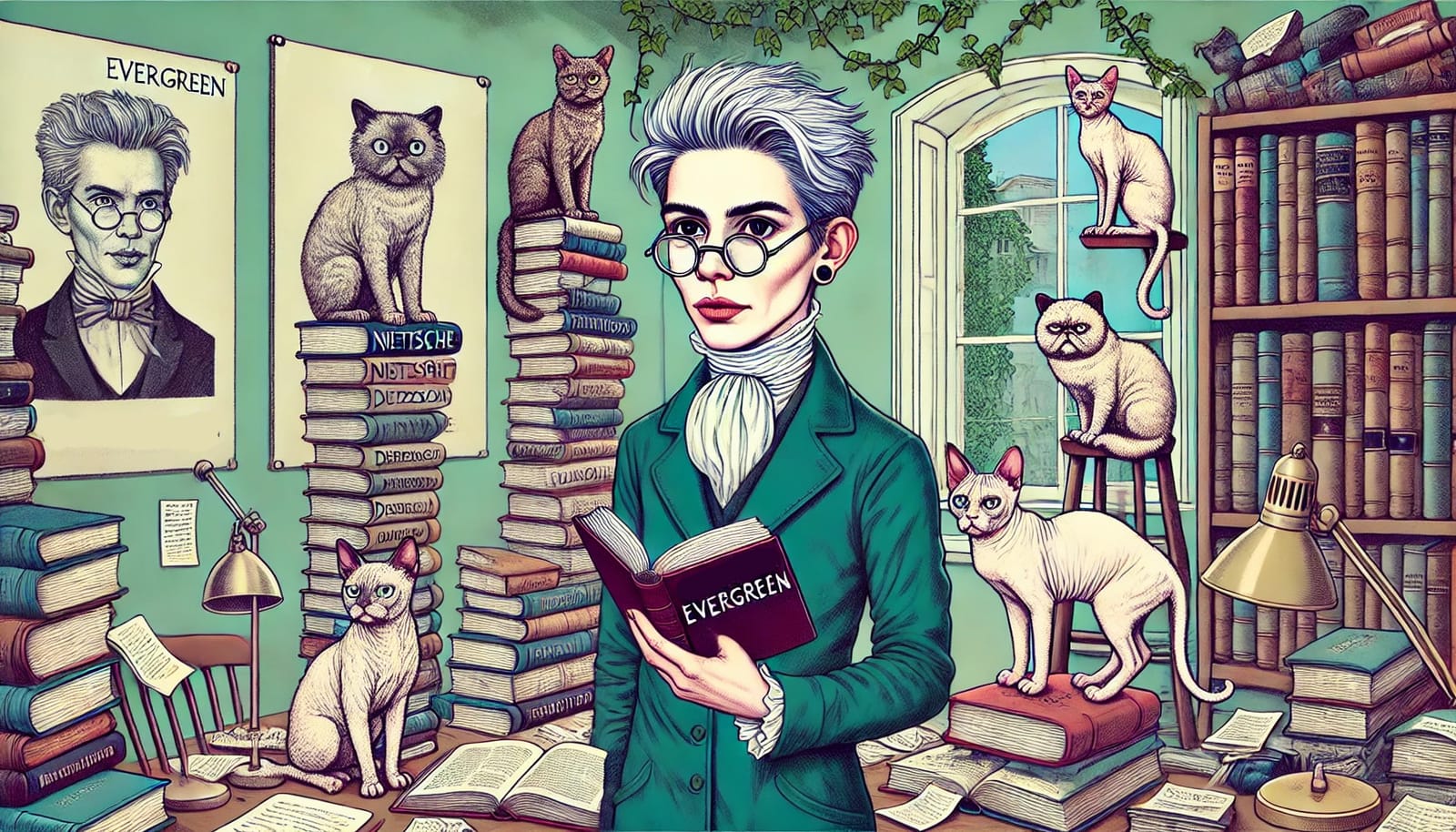Note: This piece is fictional and is part of our satire section, A Reflective Laugh. It uses wit and humour to highlight social and environmental issues, aiming to provoke thought, spark conversation and bring awareness to the complexities of the world around us.
In a quaint, ivy-covered university in the heart of academia, there lived Dr Sarah Evergreen, an advocate for Indigenous issues. Evergreen, a pale, bespectacled woman with an air of perpetual condescension, was known for her ability to intellectualise every topic, especially those concerning Indigenous peoples. Her office, cluttered with towering stacks of unread books and scattered notes, was a sanctuary of highbrow verbosity.
Evergreen's four cats, each more unsightly than the last, roamed freely among the chaos. There was Nietzsche, with his perpetually matted fur; Derrida, who was missing an eye; Foucault, a cat of indistinguishable colour due to a chronic skin condition; and Hegel, whose wheezing could be heard echoing down the halls. These feline companions were, according to Evergreen, a reflection of her complex understanding of post-colonial theory.
Evergreen was incredibly proud of her exhaustive research into Indigenous cultures. Her lectures, filled with arcane terminology and convoluted theories, left her students in awe—and utter confusion. She would speak at length about "decolonising methodologies," "epistemic violence," and "intersectional identities," often citing obscure philosophers whose relevance to Indigenous issues was dubious at best.
One day, Evergreen was invited to speak at an Indigenous community event. Arriving with an air of scholarly importance, she began her speech by thanking the organisers for the opportunity to "engage in a dialogic process of decolonial praxis." The audience exchanged puzzled glances.
As Evergreen went deeper into her prepared remarks, her language grew increasingly impenetrable. "We must interrogate the hegemonic structures of settler colonialism that perpetuate epistemological marginalisation," she declared, her voice rising with passion.
A woman from the community raised her hand. "Miss Evergreen, could you say that in plain English?"
Evergreen, taken aback, blinked rapidly trying to find her ground. "I’m advocating for the dismantling of power structures that oppress Indigenous knowledge systems," she explained, clearly frustrated by the interruption.
The woman nodded slowly. "So, you mean we should get rid of you, listen to our Elders and respect our traditions?" she asked.
"Precisely!" Evergreen exclaimed, relieved to have finally gotten through.
"But why didn't you just say that?" the woman asked.
Evergreen paused, her intellectual facade momentarily cracked. "Well, because it’s important to understand the theoretical frameworks that underpin these issues."
Another community member chimed in, "Lady, we’ve been living these issues. We don’t need a framework to tell us what we already know."
Evergreen's face reddened. She had spent years fine-tuning her academic persona, believing herself to be a champion of Indigenous rights. But now, standing before the very people she claimed to advocate for, she realised her erudite jargon had only served to distance herself from them.
Her cats, who had somehow followed her to the event, weaved through the audience, eliciting a mix of amusement and sympathy. Foucault coughed up a hairball, Nietzsche hissed at a toddler, Derrida knocked over a water jug and Hegel wheezed loudly.
As Evergreen watched the scene unfold, she felt a sudden, unsettling clarity. Her intellectual pursuits, however well-intentioned, had become a form of colonisation in themselves. She had imposed her own worldview onto the very people she sought to support, alienating them with her incomprehensible rhetoric.
From that day forward, Evergreen vowed to change. She traded her dense academic texts for conversations, listened more than she spoke and slowly learned to communicate in a way that was accessible and respectful.
Her cats, however, remained as ugly as ever.







